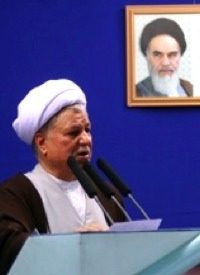
Rafsanjani is a former president of Iran and a seasoned political leader since the 1979 Iranian Revolution.
"Today is a bitter day," said Rafsanjani Friday. "People have lost their faith in the regime and their trust is damaged. It’s necessary that we regain people’s consent and their trust in the regime."
The British Guardian newspaper reported that Rafsanjani criticized the arrest and detention of protesters, attacked the lack of freedom of expression, and expressed sympathy for the families of dead protesters. His concluding remarks were: "I hope this sermon will pave a way out of this current situation. A situation that can be considered a crisis."
A report in the Los Angeles Times quoted from Rafsanjani’s sermon: "We could have taken our best step in the history of the Islamic revolution had the election not faced problems. We are in doubt today. Today, we are living bitter conditions due to what happened after the announcement of the election result. All of us have suffered. We need unity more than anytime else."
Among those seated before Rafsanjani during his address was opposition leader Mir Hossein Mousavi, who lost the election to incumbent President Mahmoud Ahmadinejad in a landslide. Mousavi’s supporters have disputed the accuracy of the vote count.
Rafsanjani was a fierce critic of Ahmadinejad during the election, but did not publicly back Mousavi. However, in the days of protest after the election, Faezeh Hashemi, Rafsanjani’s daughter, addressed hundreds of Mousavi supporters gathered together in Teheran to protest the election and was briefly detained by police.
Continuing his sermon/address, Rafsanjani said: "All of us — the establishment, the security forces, police, parliament and even protestors — should move within the framework of law. We should open the doors to debates. We should not keep so many people in prison. We should free them to take care of their families."
While the service was going on inside the hall, pro-government Basiji militiamen outside — as if to challenge the cleric’s words — fired teargas at Mousavi supporters who were demanding the release of prisoners detained for holding protest demonstrations. It was the largest anti-government protest since the demonstrations immediately following the election in June.
Rafsahjani’s influence within Iran would be hard to overestimate. Following the revolution of 1979 that deposed the Shah, he was considered for a time, while serving as the Speaker of the Iranian Parliament, to be the nation’s second-most-powerful figure, after Ayatollah Khomeini. However, his status declined when his rival, Ayatollah Hussein Ali Montazeri (an anti-American hardliner) exposed his dealings with President Reagan’s National Security Advisor Robert McFarlane, the architect of what came to be called "the Iran-Contra" scandal. (That plan involved the covert sale of weapons to Iran in exchange for cash, which was used to help fund the operations of the anti-communist Contra military forces in Nicaragua.)
Rafsanjani has always been considered a pragmatist open to discussion with the West. He currently holds the position of Chairman of the Assembly of Experts, an influential body in Iran that is charged with electing, monitoring, and even dismissing the Supreme Leader of Iran, a position much more powerful than the presidency — the object of dispute in the recent election. Rafsanjani is a tremendously wealthy man, some believe the richest man in Iran. In 2003, in an article entitled "Millionaire Mullahs" in Forbes magazine, the late journalist Paul Klebnikov (whose murder in Moscow in 2004 was described by the publisher of Forbes‘ Russian edition as "definitely linked to his professional activity") described Rafsanjani as follows:
Ironically, the man most adept at manipulating this hidden power structure is one of Iran’s best-known characters — Ali Akbar Hashemi Rafsanjani, who has been named an ayatollah, or religious leader. He was the speaker of parliament and Khomeini’s right-hand man in the 1980s, president of Iran from 1989 to 1997 and is now chairman of the powerful Expediency Council, which resolves disputes between the clerical establishment and parliament. Rafsanjani has more or less run the Islamic Republic for the past 24 years.
One thing is certain: Rafsanjani’s role in the protests against the reelection of Mahmoud Ahmadinejad indicates that the protests are not amateur events organized by mere students or disaffected workers. There is definitely heavyweight opposition within Iran to Ahmadinejad’s presidency. And given Rafsanjani’s past association with U.S. intelligence operatives, some of that opposition may come from outside Iran, as well.
Photo of Hashemi Rafsanjani: AP Images



